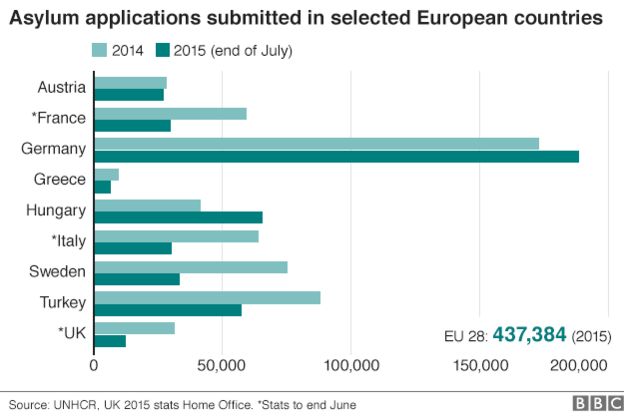Migrant crisis: PM says UK will fulfil moral responsibilities
-
3 September 2015
David Cameron has said "as a father I felt deeply moved" by the image of a Syrian boy dead on a Turkish beach.
As pressure mounts on the UK to take more of those fleeing to Europe from Syria, the PM added that the UK would fulfil its "moral responsibilities".
BBC political editor Laura Kuenssberg said she expected the prime minister to promise more action in the coming days.
Earlier, Scotland's first minister, Nicola Sturgeon accused the government of a "walk on by" attitude.
That followed the prime minister's comment on Wednesday that taking "more and more" people was not the simple answer to the current migrant crisis.
Instead, Mr Cameron said, the focus should be on bringing "peace and stability" to the war-ravaged parts of the world people were fleeing from, such as Syria.
But now, the BBC's Laura Kuenssberg says, Downing Street has "concluded the political pressure does require them to give an additional response" - though "no final decisions have been made".
'Comprehensive solution'
Calls for the UK to do more intensified on Thursday after the picture of the dead boy on the beach sparked an outcry over the human cost of the crisis.
An online petition calling on the UK to accept more refugees raced through the 100,000 threshold, meaning it is now eligible to be considered for a debate in Parliament.
Mr Cameron said: "Britain is a moral nation and we will fulfil our moral responsibilities."
He pointed out that the Royal Navy had been involved in rescue missions in the Mediterranean and said the UK was the world's second biggest bilateral donor to aid Syrians.
He said the UK would continue to take in "thousands" of refugees, but he cautioned that this was not the only answer to the crisis, saying a "comprehensive solution" was required.
"We have to try and stabilise the countries from which these people are coming," he added.
'Reduced to tears'
Speaking earlier in the day, Chancellor George Osborne said he was "very distressed" by the image of the drowned Syrian boy in Turkey - and blamed his death on so-called Islamic State and human traffickers.
He cautioned that there was no "simple answer" to this crisis but added: "You have got to make sure the aid keeps coming - we have put £1bn of overseas aid in to help these desperate people.
"And of course Britain has always been a home to real asylum seekers, genuine refugees. We have taken 5,000 people from the Syrian conflict, we will go on taking people and keep it under review."
Analysis, BBC political editor Laura Kuenssberg
One minister told me: "We must not do the wrong thing for the right reasons. There's a danger, a real one, that a sudden, dramatic invitation to more refugees could result in many more thousands of people risking their lives coming to Europe."
But I expect in the coming days the prime minister will promise more action.
One option is increasing the numbers of refugees admitted directly from camps on the Syrian borders. Another is insisting other EU countries contribute more to the refugee crisis on the ground, in exchange for Britain taking a bigger share of those arriving in Europe.
No final decisions have been made and there is no one clear solution to a complicated and fraught situation.
It is clear that Downing Street has concluded the political pressure does require them to give an additional response.
But David Cameron may look for a way to do that while not conceding his central point that this crisis will only be solved by treating the problem at its source and finding long term stability in the region.
Justin Welby, the Archbishop of Canterbury, described the situation as a "wicked crisis".
"My heart is broken by the images and stories of men, women and children who have risked their lives to escape conflict, violence," he said.
There have been cross-party calls at home and from abroad for the UK to take in more refugees, as Europe struggles to cope with the daily influx of migrants.
Attacking the government's response to the crisis, Ms Sturgeon pledged that Scotland would "stand ready to offer sanctuary to refugees that need our help".
She said she was "reduced to tears" at the image of the dead child, adding: "I am very angry at the walk-on-by attitude of the UK government and I implore David Cameron to change his position and change it today."
Ex-party chairman Baroness Warsi was among the Conservatives calling for the government to do more, suggesting more women and children refugees should be accepted by the UK.
She told the BBC Britain had a "long and proud" tradition of helping in times of crisis.
Former Labour home secretary David Blunkett told Thursday's Newsnight he thought the UK should take 25,000 refugees over a six month period.
Tory MP David Burrowes said "thousands, not hundreds" of people should be taken in, while Ruth Davidson, leader of the Scottish Conservatives, tweeted "this is not an immigration issue, it's a humanitarian one", as she called for more help for refugees.
Seeking asylum in the UK
25,771
people applied for asylum in the UK in the year ending June 2015
41%
(11,600) were granted asylum
-
14% of applicants were from Eritrea
-
9% were from Pakistan
-
8.5% were from Syria
-
2,168 applications were from unaccompanied children
Last year Britain accepted 216 people under a scheme to relocate the most vulnerable refugees, and almost 5,000 Syrians had been granted asylum in the last four years.
UKIP MP Douglas Carswell said Britain had a "duty to act" to help refugees and asylum seekers, but could only do so if it had control of its borders to cut immigration.
He also suggested that "in order to stop the horror, we need to stop the boats", warning that further tragedies would take place unless people were dissuaded from trying to make the journey.
Acting Labour leader Harriet Harman accused Mr Cameron of "lurking with his head in the sand trying to pretend that nobody cares and it's not our problem".

Full coverage of Europe migrant crisis
EU migration: Crisis in graphics
In photos: One day across destination Europe
The migrants who risk everything for a better life
Five obstacles to an EU migrants deal
Syrian's perilous journey to Sweden
Migrants or refugees?
The word migrant is defined in the Oxford English Dictionary as "one who moves, either temporarily or permanently, from one place, area, or country of residence to another".
A refugee is, according to the 1951 Refugee Convention, any person who "owing to a well-founded fear" of persecution is outside their country of nationality and "unable" or "unwilling" to seek the protection of that country. To gain the status, one has to go through the legal process of claiming asylum.
The word migrant has traditionally been considered a neutral term, but some criticise the BBC and other media for using a word they say implies something voluntary, and should not be applied to people fleeing danger.



